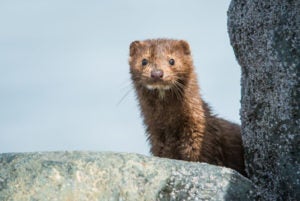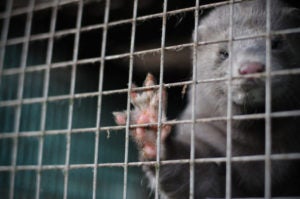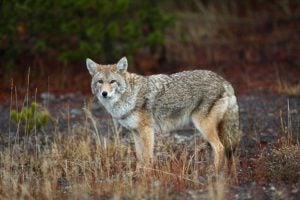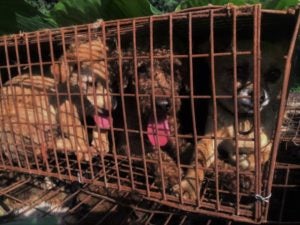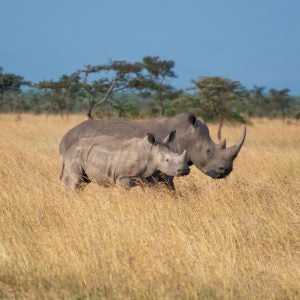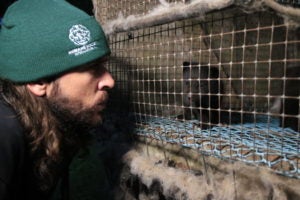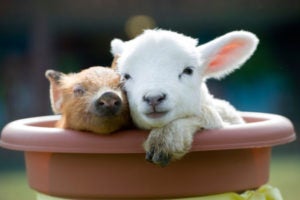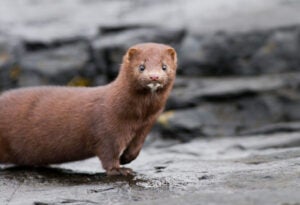
AMSTERDAM—The Dutch Government has today said it will consider a one-stop voluntary closing scheme and breeding ban for mink fur farms in the Netherlands. It aims to make a decision in August 2020 and must notify Parliament before the new mating season starts in February 2021. Any decision on the early closure scheme and financial compensation cannot be announced before notifying Parliament as it involves a State Aid measure and therefore requires approval by the European Commission.
The Government statement is in response to recent motions voted on by MPs calling for the early closure of the 128 remaining mink fur farms in the Netherlands, following outbreaks of Covid-19 on 17 fur farms since 26 April.
Animal protection charity Humane Society International fully supports the early closure of fur farming in the Netherlands. Speaking from Amsterdam, Dr Joanna Swabe, HSI/Europe’s senior director of public affairs, said: “The Dutch Government’s confirmation today that it will consider ending the inhumane practice of mink fur farming before the existing 2024 deadline is a welcome next step towards the Netherlands finally being free of fur production. Exploiting, depriving and killing animals for frivolous fur fashion is not only incredibly cruel and unnecessary, but we now know that it can also serve as a reservoir for coronaviruses, posing a risk to human health. So we urge the European Commission to approve the government’s impending request to use State Aid to facilitate the end of mink fur farming three years earlier than legally required. While it is never desirable to provide public money to the fur trade, using such funds to terminate this abusive and risky industry would be a price worth paying.”
Since April, two fur farm workers are believed “extremely likely” to have contracted the virus from mink, after which around 723,000 mink have been killed to prevent further spread, including 615,000 kits.The early closure scheme will apply to all fur farms, including farms that have culled mink due to Covid-19. A ban on the transportation of mink to prevent the spread of Covid-19 is currently in place, which means that no new mink can be brought to an already-culled mink farm.
FAST FACTS:
- SARS-CoV-2 was first identified on two mink farms in Netherlands on 26 April 2020.
- On 3 June 2020, Dutch Ministers published a final report confirming animals on the infected farms will be culled, a measure taken “in the interests of both public and animal health”.
- An estimated 60 million mink are farmed for their fur around the world, with the top three production countries China (20.6 million mink), Denmark (17.6 million mink) and Poland (5 million mink) in 2018.
- Fur farming has been banned across the UK since 2003, and has been prohibited and/or is in the process of being phased-out in the following European countries: Austria, Belgium, Bosnia and Herzegovina, Czech Republic, Croatia, Macedonia, the Netherlands, Norway, Luxembourg, Serbia, Slovakia, Slovenia and most recently the government in Ireland has committed to ending fur farming. Bulgaria, Lithuania, Montenegro and Ukraine are also presently considering bans on fur farming. A proposal to ban fur farming in Estonia was also tabled this week. In the United States, California became the first US state to ban fur sales in 2019 following similar bans in cities including Los Angeles, San Francisco, Berkeley and West Hollywood. In 2020, legislators in Hawaii and Rhode Island introduced fur sales ban proposals, as have cities in Minnesota and Massachusetts.
- Fur farming, however, continues in other countries with China, Denmark, Finland and Poland being the biggest producers, and globally an estimated 100 million animals are killed annually for their fur, including mink, foxes and raccoon dogs.
Download video of mink farms in the Netherlands (courtesy of Dutch organisations Bont voor Dieren and Animal Rights).
ENDS
Media contact: To request an interview with HSI spokespeople (Dutch and English speakers) please contact Leozette Roode, HSI/UK: lroode@hsi.org
Notes
Latest available figures show approximately 35 million mink were farmed in 2018 in Europe, including Denmark (17.6m), Poland (5m), Netherlands (4.5m), Finland (1.85m), Greece (1.2m) and Lithuania (1.2m). Figures for the same period show that mink were farmed for their fur in China (20.7m), the United States (3.1m) and Canada (1.7m), bringing the total to approximately 60 million mink globally on fur farms.

